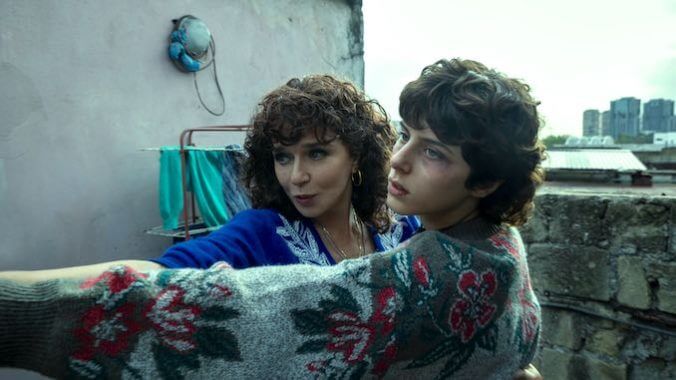Netflix’s The Lying Life of Adults Beautifully Translates Elena Ferrante’s Vibrant Story
Photo Courtesy of Netflix
There are many of us, I imagine, who were harassed by some friend or another into reading the Neapolitan novels of Elena Ferrante, starting with My Brilliant Friend, and left that tetralogy thunderstruck by the genius of what we’d read. I don’t speak Italian, but I can only guess that the translator Ann Goldstein is a genius herself, because what comes across in these books is the complicated flow of life itself, rendered in a way that is simultaneously simple and elaborate, and inarguably true. The only works of literature I’ve read that compare are Proust’s In Search of Lost Time series and the My Struggle books of Karl Ove Knausgard; stylistically, they are all different, but the startling clarity of reading them is one and the same; you feel as if you’ve unlocked a book that translates every fleeting thought and emotion you’ve ever experienced, and it doesn’t matter that you happen to be reading about a repressed Norwegian, or a rich Frenchman in fin-de-siecle France, or two poor Italian girls from the slums of Naples.
(Ferrante herself is anonymous, and after the explosion in popularity of her books in Italy and the rest of the western world, speculation ran rampant. Articles appeared across Italy using various methods to guess at her—or, in some theories, his—identity. I remember following these with interest, and I regret it now, because there is something ugly about the obsession and something lovely about the mystery.)
The challenge of translating Ferrante to a visual medium is one of preserving her voice while not becoming so reliant on the text to the point of boredom; my inexpert opinion is the achievement of that goal relies on a director with his or her own singular vision bring complementary to Ferrante’s unique tone. In Edoardo De Angelis, whose previous work I had never encountered, Netflix found the perfect match. The story here centers on Giovanna, the daughter of a professor and teacher in Naples who learns through overheard conversation about an aunt called Vittoria, considered a kind of monster by her parents. She seeks out this aunt, who still lives on the poor side of Naples, and immediately falls into the rhythms of her chaotic, passionate life. I could go on about the plot that unfolds over the show’s six episodes, but to me it’s almost irrelevant—this is a family drama, and any televised family drama is only as good as the acting and directing, with the story itself following their lead. In other words, the story is good and compelling, but what actually matters is that it’s lifted into the stratosphere by the production, just as Ferrante’s writing and characterization elevate into high art plots that could be found in any soap opera.
There isn’t a bad casting choice to be found here, but Valeria Golino as Vittoria is somewhere beyond unforgettable, capturing all the energy and intrigue and ardor of a fundamentally singular character. Giovanna’s father is afraid that Vittoria will lead his daughter astray, but the truth is that she is opening her eyes to a kind of freedom she had always craved without being able to name it. As in all of Ferrante’s work, class underlies everything, but the direction here is changed—while the Neapolitan novels hinge on the rise to a middle class life, this is about a cloistered girl who practices breakdancing in her room suddenly emerging into a vibrant world, which happens to be on a lower socioeconomic stratum. To some extent, Giovanna feels an immediate sense of belonging here, as though she can sense her father’s origins and consciously seeks them out.